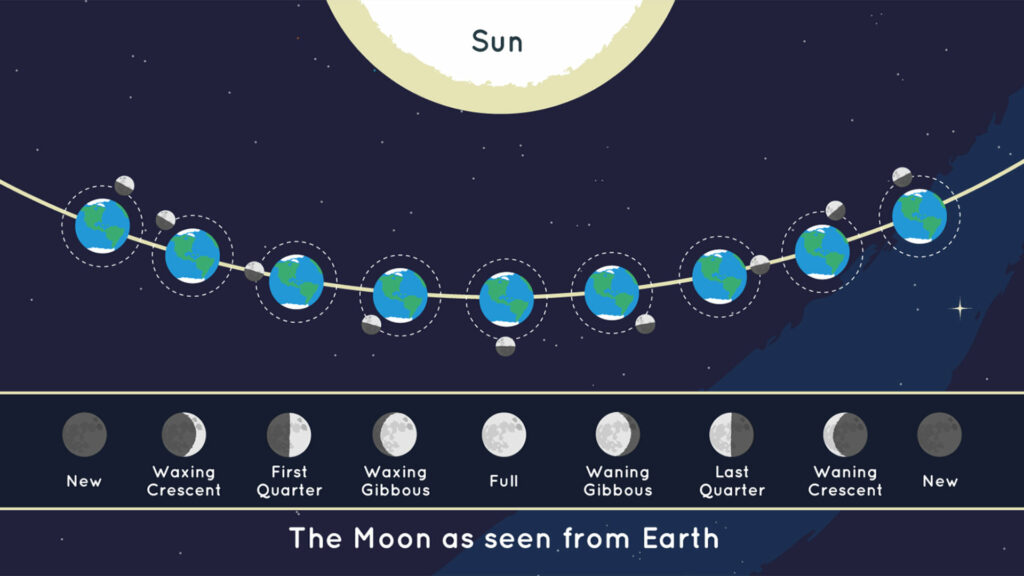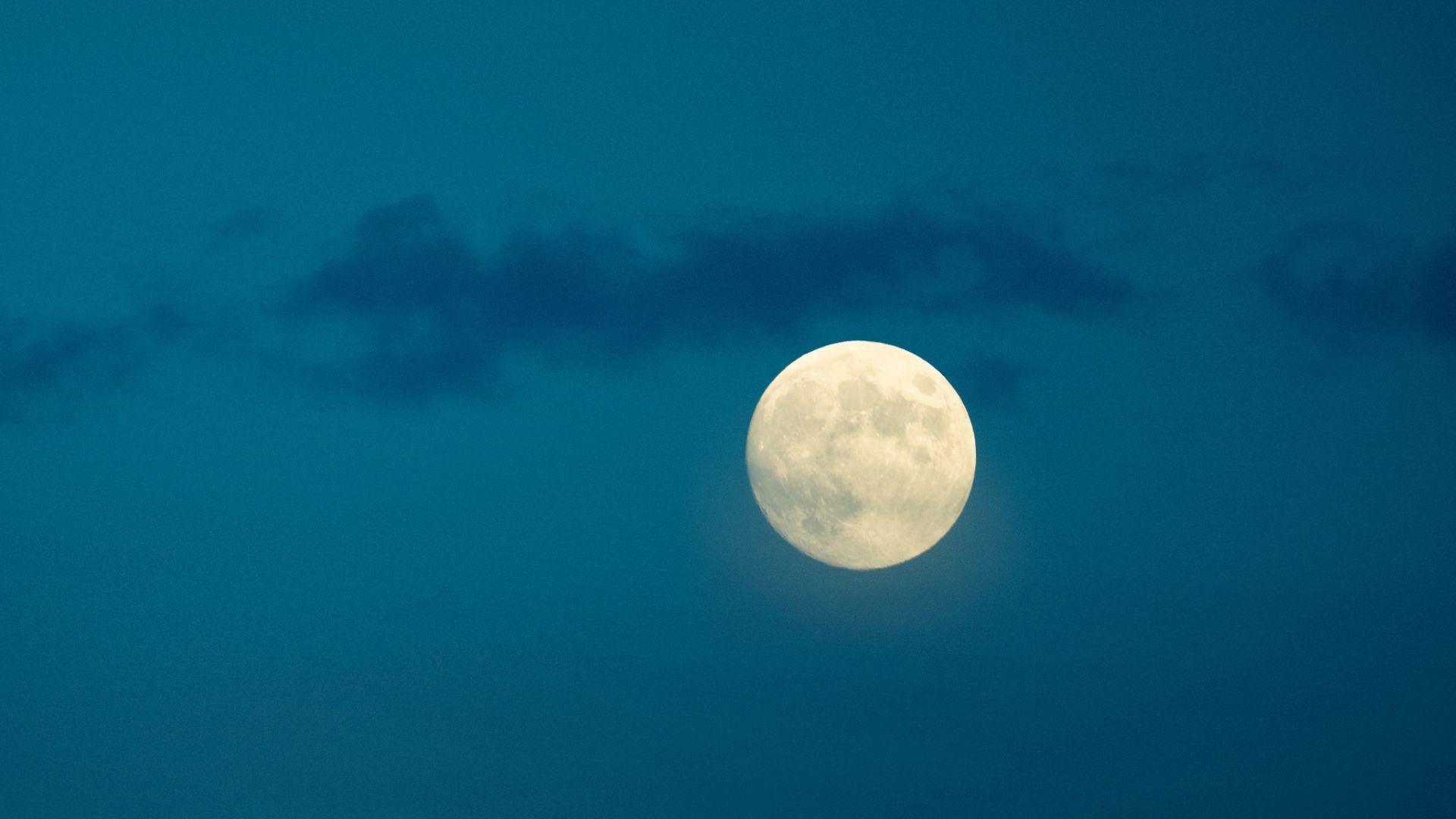The full moon is one of the lunar phases, which corresponds to the moment when the Moon is opposite the Sun. This regular and banal phenomenon is often associated with myths and legends, without it having been verified by science.
The Moon could win a poetic nickname contest. Regularly, the Earth’s natural satellite is decked out with curious expressions (“Strawberry Moon”, “Pink Moon”, “Blue Moon”…). In addition to being scientifically meaningless, they often have one other thing in common: they are simply used to describe the full moon.
Even if the full Moon is very pretty to admire, it is not a very striking or spectacular astronomical phenomenon, as showers of shooting stars can be. The full moon returns to the sky every month. Our satellite is fully visible and it appears a little brighter. This recurring astronomical event has however a pretext for many myths and legends, which have not found their scientific confirmation.
Can the Full Moon influence our mood or our health? Does it disturb our sleep? Can she change the number of births? Or increase the crime rate? We explain here why these questions call for negative answers. Too bad for the creatures of our nightmares.
What is the Full Moon?
Before going further, we must begin by recalling what a full moon is. The star does not emit its own light, but reflects that of the Sun. As on Earth, part of the Moon is therefore illuminated by the star, the other being plunged into darkness. Moreover, the Moon always presents the same face to our planet.
Thus, during the passage of day and night on the Moon, we observe lunar phases. The way in which the visible face of the Moon is illuminated evolves, during a cycle which lasts about 27 days. The Full Moon is one such phase, when the entire visible side of the Moon from Earth is illuminated by the Sun. Put more simply, we see the Moon “in full” (and not a crescent, a half-moon or a gibbous Moon).

Does the full moon influence our mood?
” Is it the full moon? » : invoking this explanation to explain someone’s bad mood has no scientific validity. Studies carried out on the subject have not shown any correlation between the visible surface of the satellite from Earth and our mood.
In May 2017, researchers compiled the results of around 30 studies looking at the supposed effects the Moon would have on us. The scientists who carried out this work have not proven that the star influences our mood. In 2013, a group of psychologists became interested in the impact of lunar cycles on mood disorders and suicidal thoughts. They conclude that the Moon has no effect on these elements. ” These unfounded beliefs are maintained by self-fulfilling prophecies “, they state.
Does the full moon affect our sleep?
Another belief associated with the Full Moon concerns our sleep. Are we at risk of sleeping less than usual or becoming downright insomniacs if the Moon is not fully visible from Earth? Again, studies on this issue have not shown conclusively that there is a correlation.
In 2013, a study claimed that there was a link between the lunar cycle and our sleep. His experimental protocol involved 30 people, who had slept 20 minutes less because of the full moon. The following year, another research team came to question this work, criticizing the low number of participants. By studying this time a panel of more than 300 people, the authors found no evidence of the influence of the star on sleep.
Three years later, a study looked at the possible effects of the full moon on the sleep of more than 5,000 children (ages 9-11). They found that their sleep time was about 5 minutes shorter during the full moon than during the new moon (where the star is hidden in our shadow). However, the authors themselves conclude that this ” minimal difference is to be considered with caution and it is not certain that it is of clinical interest. If you sleep badly every month, then it may not be the Moon to point the finger at.
Does the full moon influence the menstrual cycle?
The legend that the full moon has an impact on the menstrual cycle is well known. However, no correlation has been demonstrated between lunar phases and menstruation.
In 1980, a study published in theAmerican Journal of Obstetrics & Gynecology established a possible link between these two elements. The text does not demonstrate a synchronization of menstruation with the phases of the Moon. However, he claims that there is an observable trend, according to which women have their periods more between the first and last quarter of the Moon: out of 68 respondents, 47 had their periods at this time. This methodology, which is based on a small number of participants, seems questionable. The study included a total of 312 participants: only 68 of them had a menstrual cycle close in duration to that of the Moon (29.5 days) – or 21% of the total panel. The other 78% are excluded from the conclusions of the study.
More recently, another study showed that there was no evidence of a synchronization between the menstrual cycle and the lunar phases. It is important to note that it was made by a private company, Clue. Nevertheless, its panel is very wide: the analyzes are based on 7.5 million cycles, containing the period dates of 1.5 million users of the app. These elements do not allow us to affirm that the rules can synchronize with the new Moon, as other sources sometimes suggest.
The duration of the menstrual cycles, estimated at 29 days (this being only an average), therefore seems hastily associated with that of a lunar cycle, of about 29.5 days. ” Statistically, […] about 1 in 2 women will start their period between 3 days before or after the full moon or the new moon notes Clue. The length of a menstrual cycle and the day on which menstruation begins has no relation to the lunar cycle.
Are there more births on the full moon?
A legend has it that there are more deliveries on full moon days than at other times of the year. In 2017, the American Academy of Pediatrics (AAP) looked at births recorded between 2013 and 2014 by the National Center for Health and Statistics. No link could be observed between deliveries and the full moon.
In 1979, researchers analyzed the distribution of births registered at a hospital in Los Angeles, California, between March 1974 and April 1978 — 11,691 in total. ” The birth rate during the period studied was in no way correlated with the cycle of lunar phases “, already affirmed the authors of this study.
Is crime up on a full moon?
The number of misdeeds committed during the full moon would be greater than usual. Again, this is a myth. In 2010, researchers looked into the supposed link between the two elements. They studied the number of crimes reported during 2009 at a government hospital in Surat, India. It emerges from their study that there is no significant difference between crime events on full moon days and non-full moon days “. The crime rate has no connection with this moon phase.
In 2018, Wayne Petherick, a specialist in criminology at Bond University in Australia, observed: The only explanation I see for linking criminology to the phases of the Moon is a practicality for criminals: at the full moon, there is more light. »
Do humans turn into werewolves on a full moon?
Is it necessary to remind it? Werewolves are creatures of legend (editor’s note: exactly what a werewolf would write…). Even if they are very realistic in some fictions, you should not come across them on the evening of the next full moon. The myth of “lycanthropes” seems to already exist in Greek mythology. A study published in 2003 may help to understand the popularity of this myth: until the 20th century, wolf attacks on humans were ” an occasional, but widespread feature of life in Europe “.
It is believed that humans affected by this evil turn into werewolves on the full moon. They would then start to walk on two or four legs and would become particularly aggressive to the point of not recognizing their victims. Surprisingly, the ancient texts mentioning this myth do not necessarily speak of the full moon as a cause of transformation. From then on, it seems to have been an addition over time to reinforce the symbolic aspect of the myth.
To summarize, in reality, the Moon influences our life because:
And that’s already enough!
Subscribe to Numerama on Google News to not miss any news!
